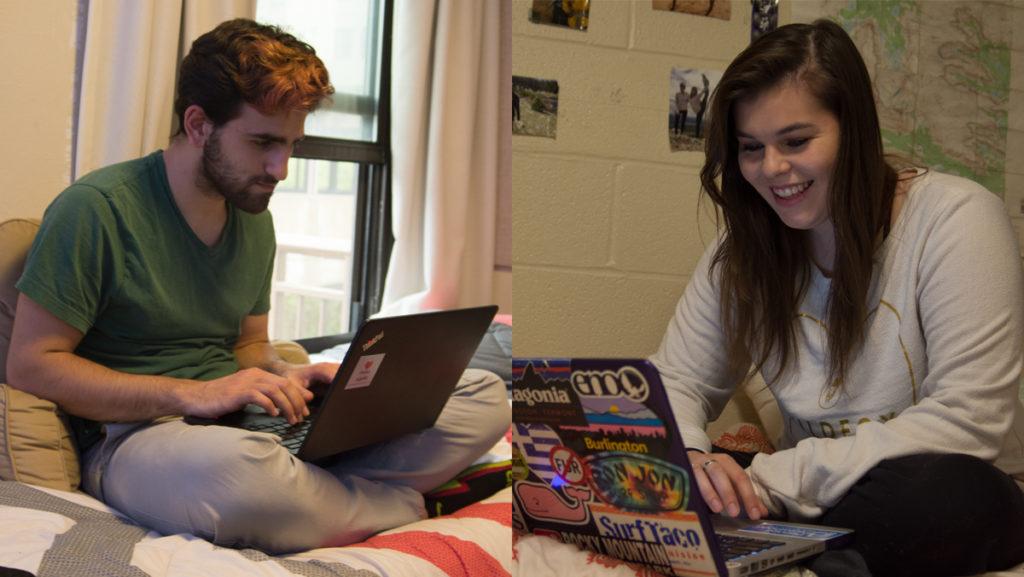Junior Emily Weeks has been in a long-distance relationship with her boyfriend Demetrios Roumbas for about a year and three months. The two were best friends during their high school careers in Linwood, New Jersey, and started dating after Weeks entered college.
Weeks said they were fully aware that she would be away in college for much of the year, but they still wanted to commit to a relationship.
“I know it was hard on him because we were best friends before we were dating, so the long-distance was already hard when we were friends,” Weeks said. “When we started dating, we were like, ‘We can make it through this. Let’s do it.’”
Though long-distance relationships are far from new, advancements in technology and social media have changed the dynamics of relationships in notable ways. The Pew Research Center reported in 2013 that 30 percent of all American internet users place phone calls using an internet calling program, and 42 percent of college or graduate degree–holders have placed online calls. In February 2017, Facebook CEO Mark Zuckerberg said 400 million users make audio and video calls with the Facebook Messenger feature. With the increase in apps and software aimed at closing the geographical distances between individuals, long-distance couples have the opportunity to flourish despite the distance.
Theresa DiDonato, associate professor of psychology at Loyola University and long-distance relationship writer for a blog on PsychologyToday, said she thinks part of the intrigue of long-distance relationships, especially during college years, is how people explore the limits of their relationships with the added pressure of being physically apart.
“Some evidence suggests that there are no major differences in intimacy, commitment or relationship satisfaction in long-distance relationships versus geologically close relationships,” DiDonato said. “Other research suggests that couples do better when they have low psychological distress, have more relationship certainty and have a good attitude about living apart.”
Senior Laurel Chase said technology made her long-distance relationship easier to handle, as it positively impacted her and her partner. Chase has been in two long-distance relationships — one lasting three years, and more recently with her current girlfriend of one and a half years, senior Monika Juodisius, who studied in Philadelphia during the beginning of the semester before returning back to Ithaca College’s campus. Chase said she used texting, FaceTime and Skype as ways to keep in touch on a regular basis.
“You don’t really get a sense of someone’s environment, or their day or what’s going on if you’re just talking on the phone or if you don’t have any visual connection,” Chase said. “I don’t understand how you’d feel connected with someone if you only talked once or twice on the phone each day and couldn’t text or be in contact more frequently.”
Chase said that while having access to technology makes it easier to be a part of someone’s day, there is also the downside of feeling removed from certain activities. She said she felt a type of pressure when it came to social media, as she was more focused on translating how her day was going to the other person instead of enjoying the moment in person.

“In terms of being able to enjoy different activities, sometimes it’s hard because you don’t feel like you’re actually there in the moment,” Chase said. “You’re trying to connect with somebody who’s not there. You spend a lot of energy trying to connect and send things outward instead of just focusing on what you’re doing.”
In addition to problems with technology, the physical proximity between couples brings about other difficulties. DiDonato said common struggles she has noticed with long-distance couples is how they handle being geographically close to one another after being apart. While she said not much research has been conducted on what happens psychologically when couples are constantly reuniting and separating, she imagines it presents both benefits and challenges.
“Some long-distance couples struggle when they find themselves in a geographically close relationship — which is often a long-term goal of long-distance couples — having to rework their relationship into a part of their daily lives,” she said.
Similarly, Weeks said the biggest challenge in her relationship thus far has been communication. She said conversations are different when they’re apart because of how easy it is to forget details from their days. She said the main difference between geographically close relationships and long-distance ones is how consistently challenging it is to overcome that barrier — nothing compares to seeing Roumbas in person.
“It’s difficult because even though we have so much — we have FaceTime and Skype and our phones — you’re still not having the natural conversations that you would have if you were face-to-face with somebody,” Weeks said. “You forget to tell each other small things. It’s hard.”
For senior Vanora Chapman, communication in her long-distance relationship has also been a challenge. Chapman said she met her boyfriend Emiliano Vargas while the two were studying abroad in Rome last fall and began dating two months ago. With Chapman in Ithaca and her boyfriend at Occidental College in Los Angeles, she said the occasional communication problems drive her to make sure she understands the nuances behind what her boyfriend says and does not say.
“A lot of [the challenge] is based on how strong your communication has to be, especially because so much of communication ends up going on over text,” Chapman said. “It’s really easy to misconstrue things or miscommunicate without even really noticing. Our one and only fight was over a very large miscommunication that neither of us noticed.”
She said she believes miscommunication issues are common among long-distance couples because there is no way to ignore problems when physically close. She said being farther away makes ignoring issues cause greater strain on relationships.
“You can’t use physical closeness and cuddling to ignore [miscommunication], which I feel happens a lot in in-person relationships,” Chapman said. “Even when I was in close relationships and we were physically separate during breaks or vacations, I noticed that the relationships tended to get a little bit better because we actually had to talk to each other.”
Weeks said another difference she’s noticed between long-distance and geographically close relationships is the amount of effort each person exerts when problems arise. She said sympathy and empathy are needed in order to be patient with the other person, as they are ultimately dealing with different everyday lives outside of their relationship.
“Long-distance makes you work harder — so you’re closer in a way because you need to know the emotions of that person more deeply,” Weeks said. “Anything you could say on the phone or over text may come across differently, so you have to work harder with understanding what they need at that time.”
Journalism assistant professor Pei Zheng said she has been with her current husband, Cris, for 10 years. They met while pursuing their undergraduate degrees, and Zheng returned to Hong Kong after graduating, while Cris went to grad school in California. She said while they did not know they would be long-distance when the relationship first began, they have now been apart for seven out of their 10 years together with Zheng teaching in Ithaca and Cris working in California.
Zheng said long-distance works better with people who are more independent, like herself, so that there’s a balance between work life and personal life.
“I really prefer to keep the two things different so family time is family time and work is work,” she said. “I’m quite comfortable switching from one to the other, but it depends on how long you’ve been in the relationship and what kind of lifestyle you prefer.”
Weeks said that while staying in contact is a challenge, it’s one she and Roumbas both accept and move past in order to keep a healthy relationship. She said having a set school schedule has made it easier to know when they’ll see each other, and in the meantime, they do their best to incorporate one another into their daily lives.
“We’ve been able to maintain it because at the end of the day, we could break up and both try to find someone else, but it’s more worth it to fight for something where you know you have that kind of connection,” Weeks said. “He’s the most fun person to be around, so I want to be with my best friend, not some other random dude.”








